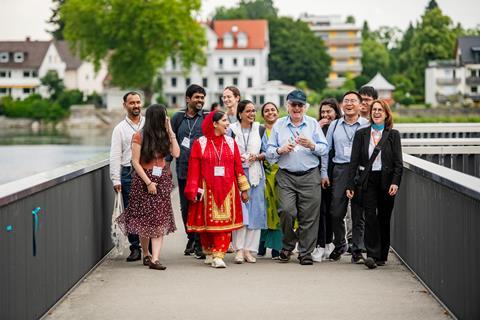Why young scientists must lead a new era of global collaboration

Attending the 74th Lindau Nobel Laureate Meeting on chemistry this summer was transformative. I was one of over 600 young scientists from all corners of the world gathered in this picturesque lakeside town, representing the next generation of researchers, innovators and thought leaders. We sat side by side with more than 30 Nobel prize winners under the event’s powerful motto: ‘Educate. Inspire. Connect.’
But let’s be clear. Lindau was not a scientific amusement park or a careerist’s trophy hunt for photos with laureates. It was a serious, urgent and deeply human experience; a space designed to forge connections across generations, cultures and disciplines.
What made this meeting special was space for real dialogue between established giants of science and emerging researchers, with the explicit goal of creating global networks of thought capable of tackling our most complex challenges.
The power of the global team
Climate change is reshaping the globe. Antimicrobial resistance is rising silently but inexorably. Inequities in access to healthcare and medicines persist stubbornly. Emerging infectious diseases, and old ones we thought confined to the global south, are increasingly everyone’s problem in a connected world.
We saw this reality in stark terms with Covid-19. A virus that crossed oceans in days forced the scientific community to break down silos at unprecedented speed. Researchers shared data, genomic sequences and clinical trial designs in real time. Pharma companies struck unlikely partnerships. Regulators worked with scientists and public health experts to deliver life-saving vaccines in record time. That collective global effort was imperfect, but it was also a great example of what we can achieve when we treat a scientific crisis as a shared human challenge.
We must replicate the Lindau model
We need spaces where emerging scientists can learn not only the hard science but also the values, the history and the social responsibility of research from laureates who have spent lifetimes thinking deeply about these things.
We need spaces where older scientists do not just lecture but listen, where they see not rivals, but young partners who can bring fresh questions and insights.
We need spaces where networks are built that persist long after the meeting ends, allowing us to collaborate across countries, disciplines and funding systems.
For young scientists, being in Lindau was also about gaining legitimacy. When we go home and say, ‘I debated green chemistry with a Nobel laureate,’ people listen. Our voices carry more weight in our labs and universities, and with our decision makers. That’s not about ego, it’s about using credibility to advocate for evidence-based policy, equitable funding and stronger science education in our own countries.
Rekindling the scientific flame around the world
Lindau’s real legacy lies in what we do next. As young scientists, we need to act as ambassadors of science in our home communities. That means communicating clearly, fighting misinformation, and making research accessible. It means mentoring younger students so they see themselves as scientists, too. It means advocating for our institutions to fund research that addresses local and global challenges, not just those that make headlines in the global north.
It also means pushing for a different kind of research culture. One less obsessed with individual prestige and more focused on collective progress. One that values interdisciplinary work and is humble about the limits of any single approach.
Older scientists: We need your help
Don’t just applaud us at ceremonial events. Support us in concrete ways. Co-author papers with us. Help us secure grants. Nominate us for conferences and editorial boards. Invite us to speak. Offer mentorship that respects our independence and our ideas. And crucially, help us build and protect the spaces where real dialogue can happen.
The scientific challenges we face demand diverse perspectives and equitable collaboration. If a single virus can shut down the world, surely we can come together to solve challenges like emerging and neglected diseases, climate adaptation, food security and mental health crises.
Personal reflections
At Lindau, we were constantly reminded that we, the young scientists in the room, will be the ones to carry the tradition of science forward for the next 30, 40, 50 years. We have time on our side, but that also means the burden is on us to take our role seriously.
We must keep the scientific flame alive, not as a career path, but as a moral commitment. We cannot lose sight of the real reasons to do science: to push the boundaries of knowledge, to improve human life, to build a more just and sustainable world.
When we lose that sense of mission, science becomes hollow. When we keep it alive, science remains one of humanity’s most powerful forces for good.












No comments yet